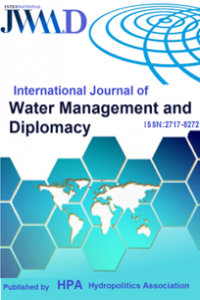Abstract
As the real world changes faster than the theoretical concepts formulated to explain it, after a certain elapsed time these concepts lose accuracy. They start gradually lagging behind the facts they once explained until they became rather narrowed and imprecise. Considering that, concepts have to be reviewed periodically to incorporate new facts and perspectives in order to converge their meanings to the new realities. This research aimed to reveal faults and inaccuracies concerning the concept of natural resources and its derivations. Additionally, we intended to update and expand them in order to recover their weakened explanatory power. Methodologically, this research undertook a conceptual revision based on authors of various backgrounds. Then, these concepts were confronted to new facts to corroborate their current inaccuracy. Thus, we drew some conclusions that allowed us to present a new definition of natural resources. To replace the dualist definition of renewable X non renewable resource, we proposed a new classification considering durable and exhaustible resources, being the first divided in four subcategories: renewable, reproducible, naturally recyclable and inexhaustible. The exhaustible resources, by their turn, were divided in two subcategories: finite and renewable badly used.
Supporting Institution
RCGI-FAPESP
Project Number
2014/50279-4
Thanks
The author gratefully acknowledge support from SHELL Brasil and FAPESP through the “Research Centre for Gas Innovation – RCGI” (Fapesp Proc. 2014/50279-4), hosted by the University of Sao Paulo, and the strategic importance of the support given by ANP (Brazil’s National Oil, Gas and Biofuels Agency) through the R&D levy regulation.
References
- Caldeiron, S. S.(1997) (org.) Recursos naturais e meio ambiente: uma visão do Brasil. 2 ed. Rio de Janeiro: IBGE.
- Craig, J. R. et al.(1996) Resources of the Earth: use and environmental impact. New Jersey: Prentice-Hall. Christopherson, R. W. (1991)Geossistemas: uma introdução à geografia física. Porto alegre: Bookman Ed, 2012.
- Cunha, A. G.(1991) Dicionário etimológico nova fronteira da língua portuguesa. Rio de Janeiro: Ed. Nova Fronteira, 1991
- Guerra, A. T.(1980) Recursos naturais do brasil. 3 ed. Rio de Janeiro: IBGE, 1980.
- IBGE. (2004)Vocabulário Básico de Recursos Naturais. 2 ed. Rio de Janeiro, IBGE
- Leff, E. (2007) Epistemologia Ambiental. 4 ed. São Paulo: Ed. Cortez. Mayhew, S. (2009) Dictionary of Geography. 4 ed. Oxford: Oxford University Press, 2009.
- Park, C.(2011) Dictionary of environment and conservation. 3 ed. Oxford: Oxford University Press.
- Saunier, R. E.;Meganck, R.A.(2009)Dictionary and introduction to global environmental governance.2 ed. London: Earthscan.
- Thomas, D. S. G.; Goudie, A. (2000) The dictionary of physical geography.3 ed. Oxford: Blackwell Publishing, 2000.
- Zimmerman, E. W. (1996) Introduction a los recursos naturales. Barcelona: Oykos-Tau, 1966.
- Godard, O. Gestão(2002)integrada dos recursos naturais e do meio ambiente: conceitos, instituições e desafios de legitimação. In: VIEIRA, P. F. & WEBER, J. (orgs.) Gestão de recursos naturais renováveis e desenvolvimento: novos desafios para a pesquisa ambiental. 3 ed. São Paulo: Cortez.
- Venturi, L. A.(2008) B. Recurso natural: a construção de um conceito.In: Ensaios geográficos. São Paulo: Humanitas.
- Weber, J. Gestão(2002) de recursos renováveis: fundamentos teóricos de um programa de pesquisas. In: VIEIRA, P. F. & WEBER, J. (orgs.) Gestão de recursos naturais renováveis e desenvolvimento: novos desafios para a pesquisa ambiental. 3 ed. São Paulo: Cortez.
Abstract
Project Number
2014/50279-4
References
- Caldeiron, S. S.(1997) (org.) Recursos naturais e meio ambiente: uma visão do Brasil. 2 ed. Rio de Janeiro: IBGE.
- Craig, J. R. et al.(1996) Resources of the Earth: use and environmental impact. New Jersey: Prentice-Hall. Christopherson, R. W. (1991)Geossistemas: uma introdução à geografia física. Porto alegre: Bookman Ed, 2012.
- Cunha, A. G.(1991) Dicionário etimológico nova fronteira da língua portuguesa. Rio de Janeiro: Ed. Nova Fronteira, 1991
- Guerra, A. T.(1980) Recursos naturais do brasil. 3 ed. Rio de Janeiro: IBGE, 1980.
- IBGE. (2004)Vocabulário Básico de Recursos Naturais. 2 ed. Rio de Janeiro, IBGE
- Leff, E. (2007) Epistemologia Ambiental. 4 ed. São Paulo: Ed. Cortez. Mayhew, S. (2009) Dictionary of Geography. 4 ed. Oxford: Oxford University Press, 2009.
- Park, C.(2011) Dictionary of environment and conservation. 3 ed. Oxford: Oxford University Press.
- Saunier, R. E.;Meganck, R.A.(2009)Dictionary and introduction to global environmental governance.2 ed. London: Earthscan.
- Thomas, D. S. G.; Goudie, A. (2000) The dictionary of physical geography.3 ed. Oxford: Blackwell Publishing, 2000.
- Zimmerman, E. W. (1996) Introduction a los recursos naturales. Barcelona: Oykos-Tau, 1966.
- Godard, O. Gestão(2002)integrada dos recursos naturais e do meio ambiente: conceitos, instituições e desafios de legitimação. In: VIEIRA, P. F. & WEBER, J. (orgs.) Gestão de recursos naturais renováveis e desenvolvimento: novos desafios para a pesquisa ambiental. 3 ed. São Paulo: Cortez.
- Venturi, L. A.(2008) B. Recurso natural: a construção de um conceito.In: Ensaios geográficos. São Paulo: Humanitas.
- Weber, J. Gestão(2002) de recursos renováveis: fundamentos teóricos de um programa de pesquisas. In: VIEIRA, P. F. & WEBER, J. (orgs.) Gestão de recursos naturais renováveis e desenvolvimento: novos desafios para a pesquisa ambiental. 3 ed. São Paulo: Cortez.
Details
| Primary Language | English |
|---|---|
| Subjects | International Relations |
| Journal Section | Research Articles |
| Authors | |
| Project Number | 2014/50279-4 |
| Publication Date | June 15, 2020 |
| Published in Issue | Year 2020 Volume: 1 Issue: 1 |
.png)
.png)


